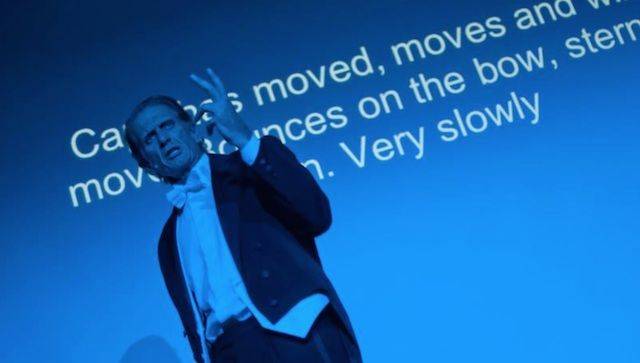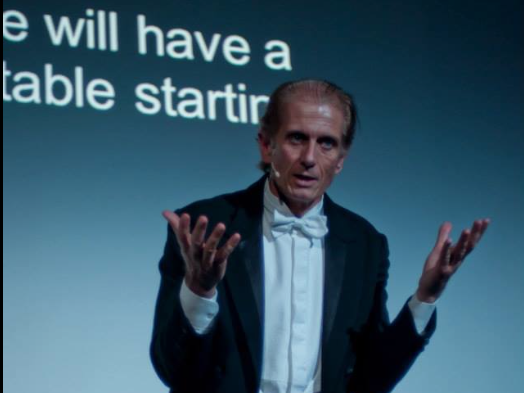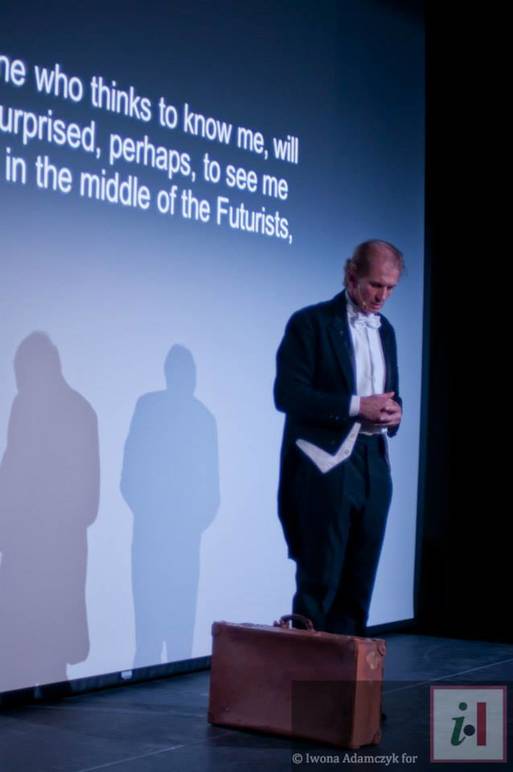Bringing Futurism to the Stage with Finazzer Flory
“Tonight we are here to celebrate Futurism, one of Italy's greatest cultural movements. As the Italian Futurism show at the Guggenheim Museum is about to end we are dedicating more to his revolutionary movement that finds in NYC the perfect city for its praise of movement, speed and struggle.” Fabio Troisi, cultural attaché to the Italian Cultural Institute in New York, quickly introduced with these words the first event after summer's break, A Great Futurist Evening, a monologue directed and performed by Massimiliano Finazzer Flory. The actor gives an intense, incendiary performance, that not only retraces the key moments of a revolutionary movement but that “touches the identity of man, at the heart of which voice and body come together to sing, the great crowds agitated by work, pleasure and revolt.”
Adapted from words by Filippo Tommaso Marinetti, an Italian poet and editor and the founder of the Futurist movement, and Giovanni Papini, a journalist, critic, poet, novelist, and one of the most outspoken and controversial Italian literary figures of the early and mid20th century, A Great Futuristic Evening “depicts the life, the movement, the power and the habit of energy that the Futurists demanded from Italy, a country that had, perhaps, already lost the love of danger and fearlessness.”
This is a show that praises a movement of the past that still has a lot to do with our present. In Finazzer Flory's own words to the press, “the futurists railed against the slow pace of things and praised the sovereignty of the imagination, exalted a technological civilization and its dangerous beauty, they foresaw the advent of the smart devices we are now using... the creation of a city suspended among wires of smoke, is what we now call Google, wireless imagination is our Wifi, tattalismo, the futurist belief that touch is important in discovering new senses is now called touchscreen, the spectators at the center of a painting... a web site.”
But there's more that talks about the present in the words that Finazzer Flory passionately blurts out during his monologue... Italy is described as a “flea market,” a country that needs to be transformed, shaken from its pensive immobility and taken by the beauty of speed and change. “It is from Italy that we launch through the world this violently upsetting incendiary manifesto of ours. With it, today, we establish Futurism, because we want to free this land from its smelly gangrene of professors, archeologists, ciceroni and antiquarians,” Marinetti wrote in the Manifesto of Futurism in 1909.
“We are in the hands of the bourgeoisie, the bureaucracy, the academics. Opening the window is not enough, we need to break down the doors. Words are not enough, we need to kick,” Giovanni Papini, said in a speech against Rome in 1913 (Speech in Rome and Why I am a Futurist). “I am a Futurist because Futurism means Italy – an Italy that is greater than the Italy of the past, more modern, more courageous, more advanced than other countries.” Papini worked against a useless admiration of the past in favor of the young generation, who should help the nation move forward. The speech, the grand finale of the evening, could not resonate more actual to all those who, a century later, think that Italy is a country in stagnation who needs to move forward in order to get out of its current crisis. “In Italy there is no other company to hang around what if not the futurists – the very serious fact remains, gentlemen, that among these futurists there are geniuses that are worth much more than the pretty redundant chimpanzees that laugh in their face.” Who are the futurists of today? Who is going to help Italy move forward?





































i-Italy
Facebook
Google+
This work may not be reproduced, in whole or in part, without prior written permission.
Questo lavoro non può essere riprodotto, in tutto o in parte, senza permesso scritto.